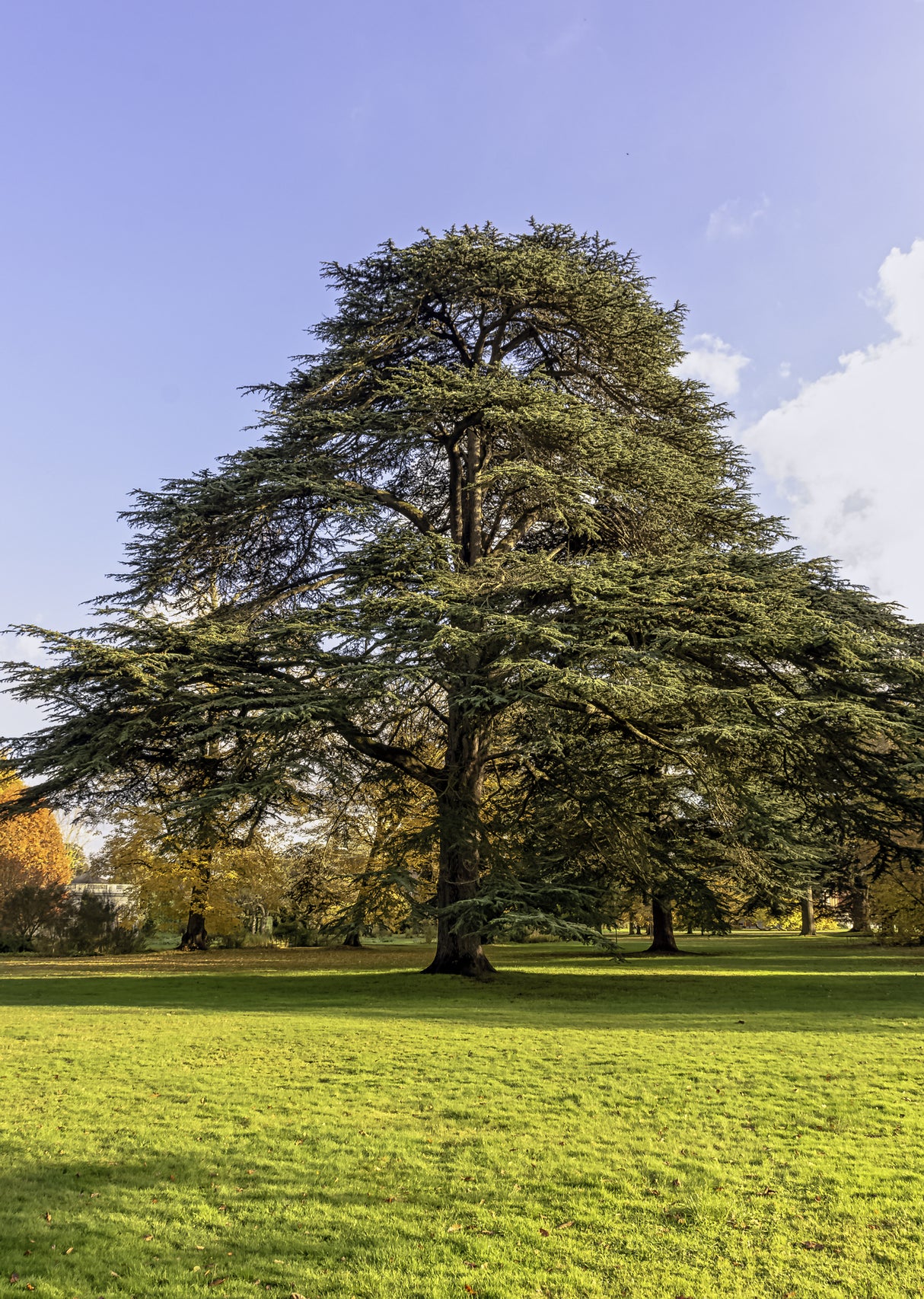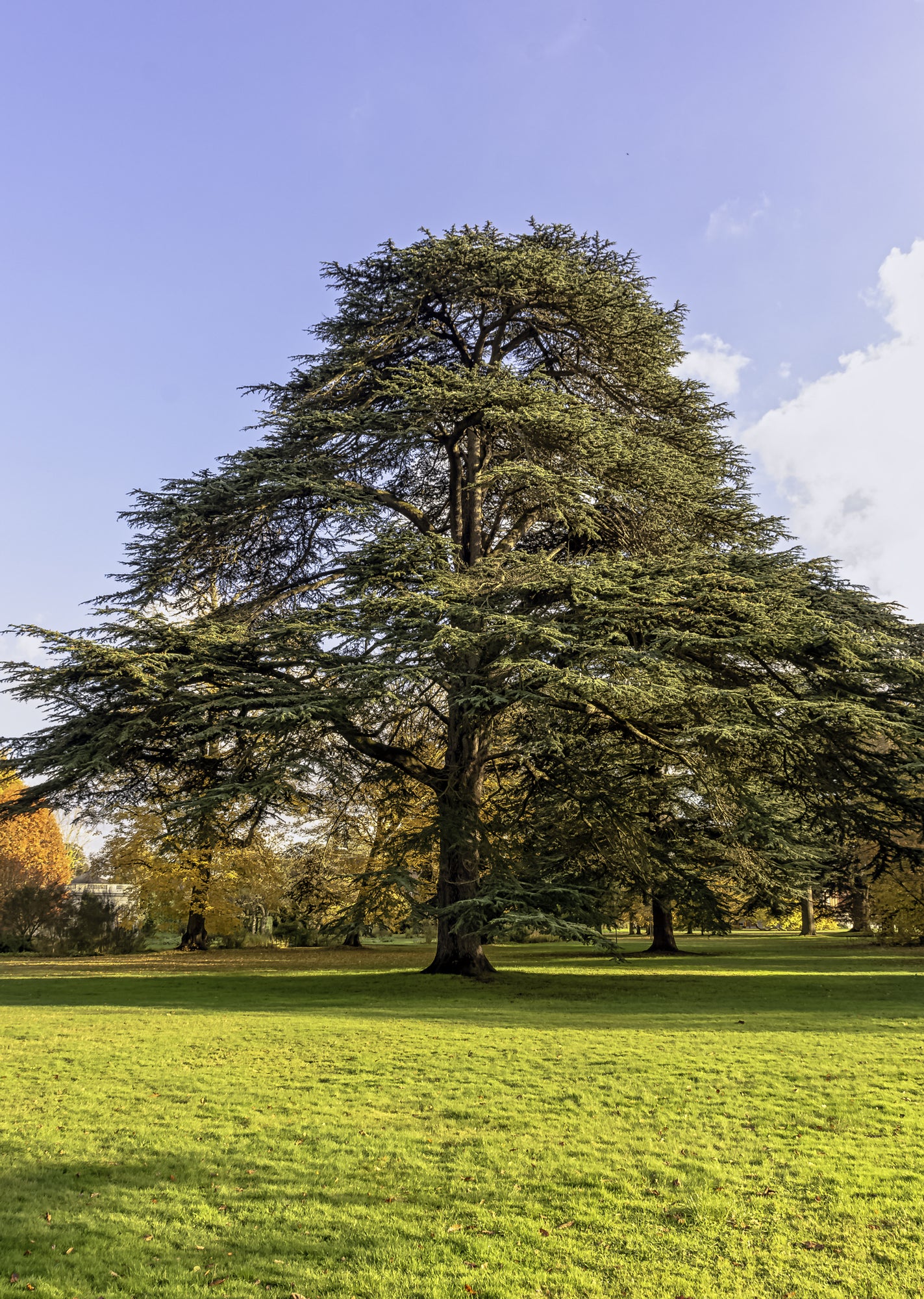Description
Description
The Cedrus libani, or Cedar of Lebanon, is an iconic, slow-growing evergreen conifer native to the eastern Mediterranean, prized for its majestic form and historical significance. Growing up to 25–40 meters tall, it develops a wide, spreading canopy with layered, horizontal branches and dense, dark green needle-like foliage. Mature trees often exhibit a flat-topped crown, adding to their architectural beauty.
This hardy and long-lived tree is ideal for large gardens, parks, and formal landscapes, providing shade, structure, and a timeless presence.
Specifications:
- Height: 25–40 meters
- Width: 10–20 meters
- Native to: Eastern Mediterranean, including Lebanon, Turkey, and Syria
- Foliage: Dense, dark green needles arranged in clusters; evergreen
- Growth rate: Slow
Conditions:
- Soil: Prefers well-drained, loamy, or rocky soils; tolerates alkaline conditions
- Light: Full sun
- Water: Moderate; drought-tolerant once established
- Climate: Thrives in temperate and Mediterranean regions
Additional Features:
- Form: Broad, flat-topped crown with layered, horizontal branching in maturity
- Uses: Ideal as a feature tree, shade provider, or in formal landscapes and large gardens
- Spacing: Plant 10–15 meters apart for individual growth or grouped plantings
- Low Maintenance: Requires minimal pruning; remove deadwood to maintain structure
- Pest Resistance: Naturally resistant to most pests with proper care
- Longevity: Extremely long-lived, with some specimens surviving for thousands of years
- Cultural Significance: Revered in ancient cultures; featured in religious texts and national emblems
- Environmental Benefits: Provides habitat for wildlife, stabilizes soil, and sequesters carbon
The Cedar of Lebanon is a symbol of strength and permanence, perfect for adding grandeur and historical depth to large-scale landscapes and formal gardens.
Delivery Information
Delivery Information
We offer flexible delivery options to ensure your tree arrives in perfect condition, whether you're located nearby or on the other side of the world.
- Domestic Deliveries:
We provide reliable delivery services across the country, utilizing our fleet of specialized trucks and train freight networks. Whether you're in a metropolitan area or a remote location, we ensure your trees arrive safely and efficiently. - International Deliveries:
For our global customers, we coordinate delivery via sea freight. With 30+ years of exporting experience, every tree is carefully prepared to meet international biosecurity standards and packaged for safe transport to its destination.
Our team will work closely with you to arrange the most suitable delivery method based on your location, project timeline, and tree size. No matter where you are, we ensure a seamless delivery experience.
Have additional questions? Contact us to discuss your specific delivery requirements!
FAQ's
FAQ's
How are ex-ground trees prepared for delivery?
All ex-ground trees are carefully dug with their rootball intact to preserve the root system and minimize transplant shock. Each tree is stabilized and treated with specialized solutions to promote health during transit. The rootball is wrapped to retain moisture and protect it from damage, and water crystals are added to provide essential nutrients and hydration for the journey. These meticulous preparations ensure your tree remains healthy and ready for planting, whether it’s traveling across the country or overseas.
How long does delivery take?
Delivery times vary depending on your location and the size of your order. Domestic deliveries typically take 1–2 weeks, while international shipping may take several weeks depending on the destination. Contact us for specific timelines.
Are there minimum order quantities for delivery?
For local and nationwide orders, there are no strict minimums, though delivery costs may vary based on order size. For international orders, a minimum quantity is often required to optimize freight efficiency. Contact us to discuss your needs.
Do you provide installation services?
While we focus on the supply and delivery of trees, we can connect you with trusted landscaping partners who specialize in tree installation and site preparation.
Can I visit your farms to select trees?
Yes, we welcome visits to our farms by appointment. Seeing the trees in person allows you to select the perfect specimens for your project. Contact us to schedule a visit.



 Inspection available upon request
Inspection available upon request
 Photos are of example stock
Photos are of example stock
 International Delivery Available
International Delivery Available
 Available For Export
Available For Export
